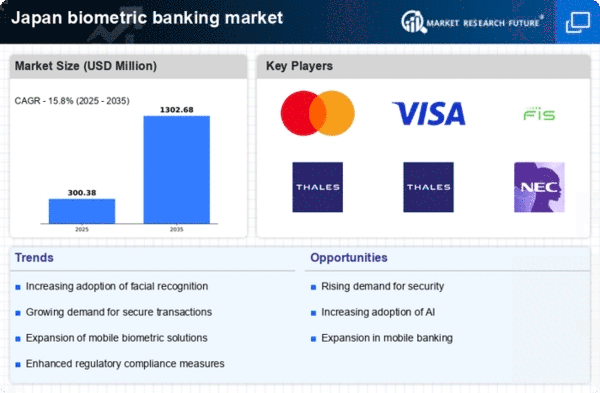Rising Cybersecurity Concerns
In Japan, the biometric banking market is significantly influenced by rising cybersecurity concerns. With the increasing frequency of cyberattacks and data breaches, financial institutions are compelled to adopt more secure authentication methods. Biometric solutions offer a robust alternative to traditional passwords, which are often vulnerable to hacking. As of November 2025, it is estimated that nearly 70% of Japanese banks are prioritizing biometric authentication to mitigate risks associated with identity theft and fraud. This heightened focus on security is not only a response to consumer demand for safer banking experiences but also a regulatory requirement to protect sensitive financial information. The biometric banking market is thus positioned to expand as institutions seek to enhance their security frameworks, ensuring customer trust and compliance with stringent regulations.
Government Initiatives and Support
Government initiatives in Japan are playing a crucial role in the expansion of the biometric banking market. The Japanese government has been actively promoting digital transformation across various sectors, including finance. Policies aimed at enhancing cybersecurity and encouraging the adoption of innovative technologies are fostering a conducive environment for biometric solutions. As of November 2025, government-backed programs are providing financial incentives for banks to implement biometric authentication systems. This support not only accelerates the adoption of biometric technologies but also ensures that financial institutions comply with national security standards. The collaboration between the government and the banking sector is likely to enhance the overall trust in biometric solutions, thereby driving market growth. Such initiatives indicate a strategic alignment between public policy and technological advancement in the biometric banking market.
Consumer Demand for Seamless Transactions
The biometric banking market in Japan is also driven by consumer demand for seamless and efficient transaction experiences. As customers increasingly favor convenience, biometric authentication methods are becoming more appealing due to their speed and ease of use. In November 2025, surveys indicate that approximately 65% of Japanese consumers prefer biometric solutions over traditional methods for their banking transactions. This shift in consumer behavior is prompting banks to integrate biometric technologies into their services, thereby enhancing customer satisfaction and loyalty. The ability to conduct transactions quickly and securely without the need for passwords or PINs is reshaping the banking landscape. Consequently, financial institutions are likely to invest more in biometric solutions to meet evolving consumer expectations, thereby propelling the growth of the biometric banking market.
Technological Advancements in Biometric Systems
The biometric banking market in Japan is experiencing a surge due to rapid technological advancements in biometric systems. Innovations in fingerprint recognition, facial recognition, and iris scanning technologies are enhancing the accuracy and reliability of biometric authentication. As of November 2025, the market is projected to grow at a CAGR of approximately 15% over the next five years, driven by these advancements. Financial institutions are increasingly investing in sophisticated biometric solutions to improve security and streamline customer interactions. This trend indicates a shift towards more secure banking practices, as customers demand higher levels of protection for their financial data. The integration of artificial intelligence and machine learning into biometric systems further enhances their capabilities, making them more appealing to banks and consumers alike. Consequently, the technological evolution within the biometric banking market is likely to play a pivotal role in shaping its future landscape.
Competitive Pressure Among Financial Institutions
The competitive landscape among financial institutions in Japan is a significant driver of the biometric banking market. As banks strive to differentiate themselves in a crowded marketplace, the adoption of biometric technologies is becoming a key strategy. Institutions are increasingly recognizing that offering advanced security features can attract tech-savvy customers and enhance their market position. By November 2025, it is anticipated that over 50% of banks in Japan will have integrated biometric authentication into their services. This competitive pressure is not only pushing banks to innovate but also to collaborate with technology providers to develop cutting-edge biometric solutions. The race to offer superior customer experiences through enhanced security measures is likely to fuel further investment in the biometric banking market, as institutions seek to stay ahead of their rivals.
















